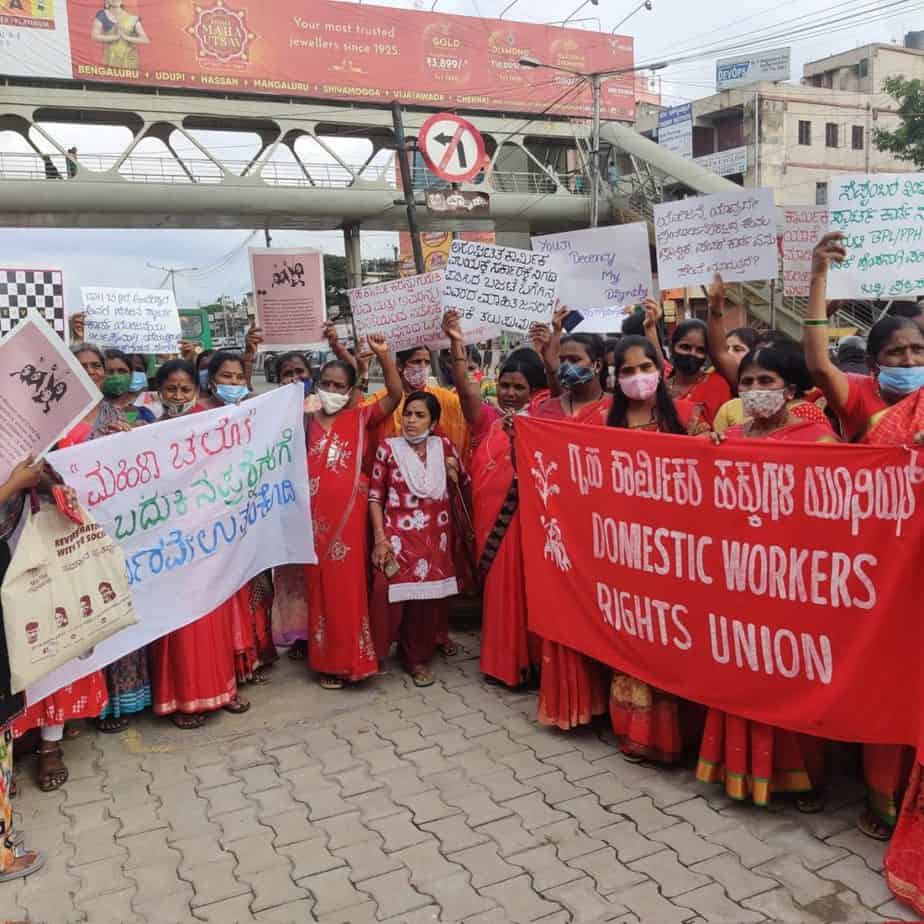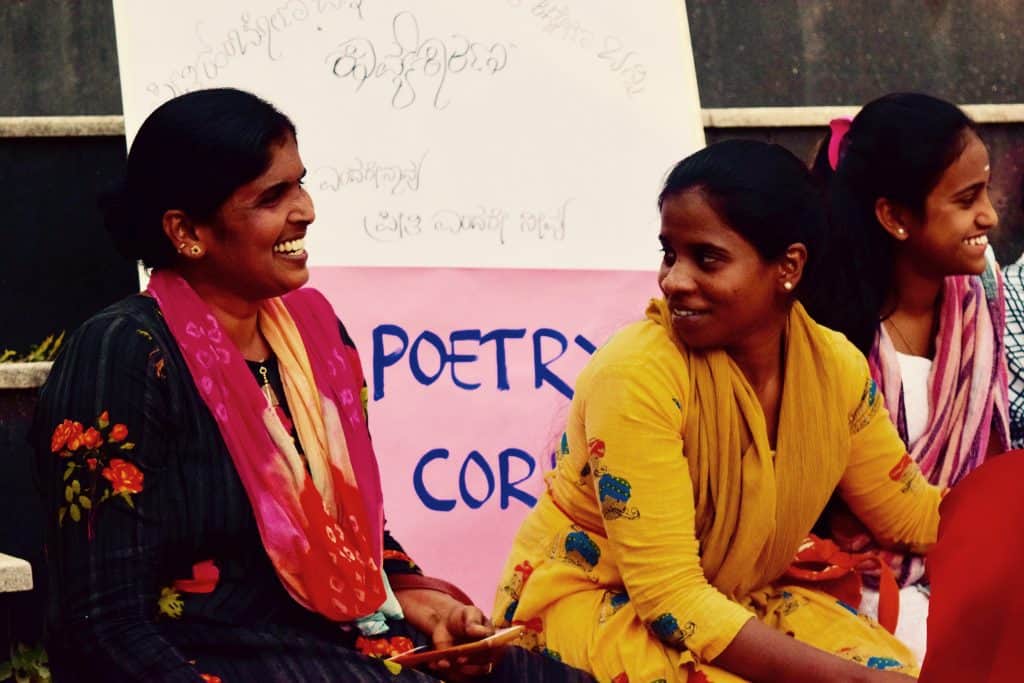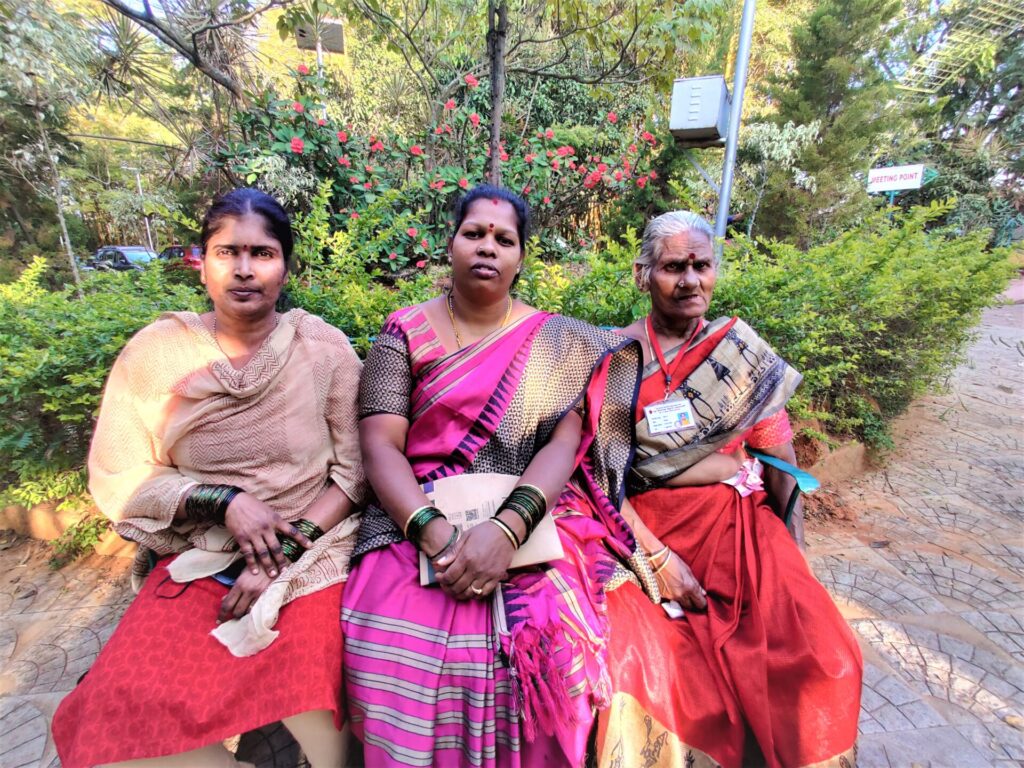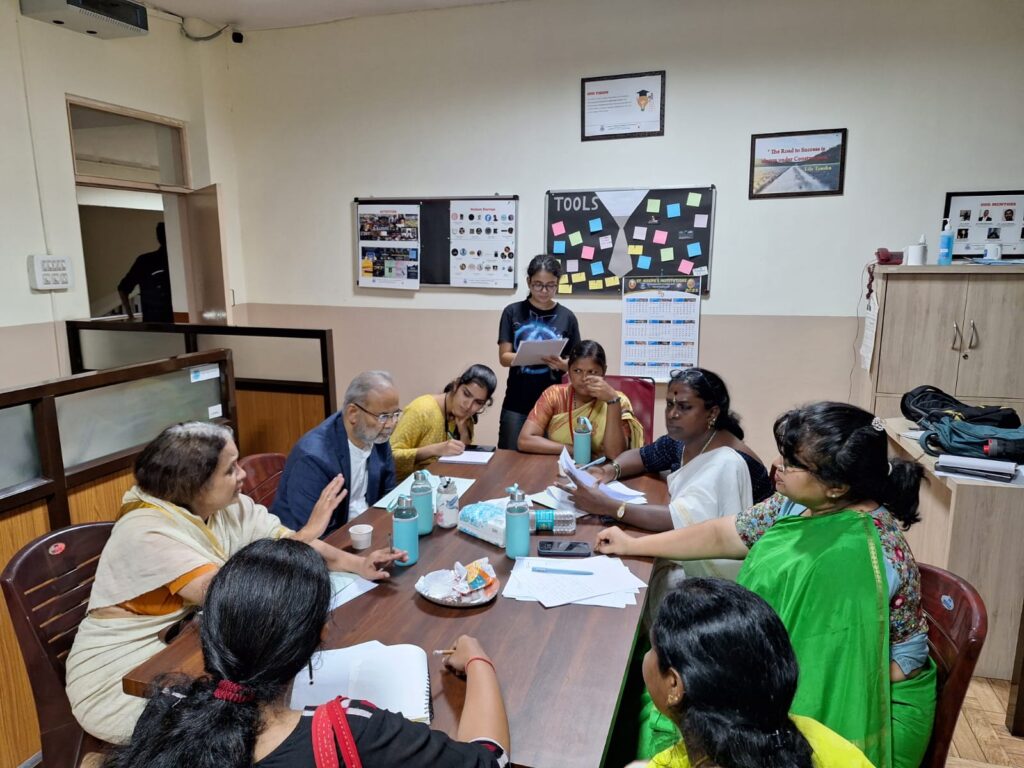The auditorium was packed with women dressed in their best, clutching umbrellas. The week-long rainy weather and the challenge of getting to the venue, St Joseph’s College of Commerce, during the evening rush hour did not deter members of the Domestic Workers’ Rights Union from gathering there on July 26th to hold a public hearing to air grievances and demand their rights.
One by one, domestic workers walked onto the stage to give testimony and speak about their challenges while officer bearers of the union provided the context.
The women raised several issues, including wage theft, false criminalisation and police harassment, retirement support for senior domestic workers, workplace safety, conditions for live-in migrant domestic workers and local domestic workers under the gig economy.
The union had invited a group of eminent people, comprising trans-rights activist Akkai Padmashali, former Jayanagar MLA Sowmya Reddy, Senior Advocate B T Venkatesh, retired IAS officer Renuka Vishwanath, president of the union Lakshmi, and member Sandhya, as an informal committee to hear the workers’ complaints and and make a set of recommendations that the union could take up.
In part 1 of this series, we look at some of the issues and stories as recounted by the women.
How a single mother fought for her wages
Before being hired as a domestic worker at a posh Prestige apartment in South Bengaluru, Gangarathna was questioned in detail about her work experience, previous jobs and cooking repertoire. She was even expected to work on a trial basis for a few days (unpaid) before her prospective employers, a well off joint family, finally hired her.
The gated community where she worked had a fixed rate for domestic workers: Rs 800 per day and Rs 1,000 for Sundays. Gangaratha’s working hours in her new job was noon to 6 pm, primarily cooking and cleaning. During this period, she was not allowed to drink water or use the toilet in the house where she worked. “If I left during work hours to use the toilet outside, I was fined,” Gangarathna recalls.
In January of this year, Gangarathna quit the job, providing a month’s notice period to her employers. In March 2023, her dues had still not been paid. According to her employers’ calculation, they owed her Rs 19,500. They paid her Rs 8,112 in March. After having to make repeated trips in vain to her employers’ home asking to be paid the remaining amount, Gangarathna approached the union.
It was the union’s efforts that finally forced her former employers to pay up.
Read more: Domestic workers protest lack of social security, ineffective govt scheme

Old clothes and sweets
Lakshmamma has a similar tale. She worked for a family for six months. She was paid regularly for the first two months; her employers then delayed payment for four months. She had enough, quit her job and demanded her arrears, amounting to Rs 15,000, be paid. “She (the employer) called me ungrateful and reminded me of all the times she gave me leftover food or sweets or old clothes,” Lakshmamma says. “I told her I never asked for charity, only my rightful earnings. She verbally abused me.”
With the support of other union members, Lakshmamma was able to demand her dues. “The lady’s husband paid me Rs 11,500. He promised the remaining money in three days,” she says. When she went back for the money, she found her entry to the apartment complex was blocked. Tired of fighting repeatedly, Lakshmamma is considering forgoing the money rightfully due to her.
According to the union, this kind of wage theft is one of the most common issues that domestic workers face. Yashodha, a union member and field coordinator for Stree Jagruthi Samithi, points out that wage negotiations are often arbitrary and rarely in keeping with the State mandated minimum wage. And when wage theft occurs, there is no real redressal mechanism as there is no agency where domestic workers can complain.
Dying on the job
The union then recounted incidents where two women had lost their lives on the job. Vijayamma, who is from Madiwala, was cleaning toilets at the home where she worked when she collapsed and died. The domestic worker had young children and was the sole earner of her family. While her employers gave her family some money, the union approached the labour department for help to support the family. The labour department claimed that only family members could can make the claim and that the Union had no locus standi in the issue. In the end, with no support, Vijayamma’s eldest daughter gave up her education and began working to support her younger siblings.
Pandemic, uncertainty and risks
The pandemic brought in much greater economic uncertainty for domestic workers. With no work from home option and mandatory lockdown, domestic workers were often fired with no notice or compensation. Forcing them to make some tough choices.
Chitra, a 35-year-old cook from Meenakshi Layout, Kengeri, was pressured to come to work at a home during the deadly Delta wave of the COVID-19 pandemic. Her employers, one of whom had contracted the illness, promised her that they would restrict themselves to a separate room and avoid contact. They assured Chitra that this would be sufficient to keep her from contracting the virus.
Afraid she would lose her job, she continued to work in the infected home. However, within three days Chitra had contracted the illness and died a few days later. Her employers, who recovered from the illness, did not offer any support to her two children or husband.
In both cases, union workers point out that there is no law outlining responsibility for loss of life at work. “It is not clear if the labour department should bear the responsibility for compensating workers’ families or the employers,” says Geetha Menon, union member and co-founder of the Stree Jagruthi Samithi.
Read more: Domestic workers to protest loss of jobs, wages during lockdown

Sexual harassment
Pooja, a young domestic worker, is still traumatised by her experience of facing sexual harassment at one home. Union members recounted her story. She often found herself dealing with the unwanted attention of a male employer. The man sent her lewd videos and messages. Fearing job loss and economic difficulties, Pooja endured the harassment for six months. Finally, unable to bear the abuse she informed the male employer’s wife and quit. Unlike in the formal sector, domestic workers have no protection against sexual harassment at the workplace.
A senior citizen dreams of retirement
At nearly 80, Chennamma is perhaps one of the oldest members of the union. She still works so that she has some income of her own. “I don’t like being dependent on my family as they have their own expenses,” she says. The government pension of Rs 1,000 per month hardly covers any costs.
The COVID-19 pandemic caused major job losses and economic crises in the unorganised sector. To counter this, the central government introduced the e-shram card for unorganised sector workers to track wages and access state and central government schemes with a single identity card.
The domestic workers rights union estimates that 83% of senior domestic workers lost their jobs during the pandemic. While the benefits of the e-shram card are not clear to many who have enrolled, senior citizens like Chennamma are not even eligible. Chennamma has also registered for a smart card under the Ambedkar Karmika Sahaya Hastha, but she is yet to see any benefits. With no income or benefits from the labour department, for Chennamma retirement and rest remain distant dreams.
Many of these problems remain because the Karnataka State Unorganised Workers Social Security Board (KSUWSSB) remains a hollow entity. “We have not seen any schemes or benefits from the board so far,” says Geetha Menon.
Read more: E-shram report card: Workers complain of lack of information and interest from city agencies

False criminalisation and police atrocity
Chandana Mary will never forget the worst day of her life. It was supposed to be one of her happiest days, her birthday. In September last year, Chandana Mary began working at the household of a young techie couple with a baby in a posh apartment complex near Viveknagar for two months. Her husband wasn’t too keen on her taking on yet another house, but Chandana persisted. “I thought I would get some extra cash to buy Christmas presents,” she said.
On November 7th, her birthday, Chandana dressed up nicely and made plans to meet her husband, an auto driver, later and left for work early in the morning. She recollects that her employers did a double take on seeing her dressed up in her finery, but otherwise the morning went without incident. Chandana cleaned and cooked and left the home to meet her husband for breakfast. She then continued working in multiple homes (some in the same complex) and an office.
Towards the afternoon, her early morning employer called her. The first thing that struck Chandana was that the female employer addressed her by name. “She always used to call me Aunty. But that day she called me Chandana.”
The female employer told Chandana that a diamond ring lying in the kitchen had gone missing. Although she denied having seen or taking a diamond ring, Chandana went back to the house to sort out any misconceptions. There, the security guards of the apartment searched her bag. Female security guards strip searched her in the employers’ kitchen. They found nothing. “I told the woman I had not taken the ring. I told her I have done housework for nearly 25 years, I have never been accused of such a thing.” The employers let her go.
The incident disturbed Chandana greatly. Her husband advised her to forget about the job; the couple went to church to light a candle and pray. The next day, Chandana didn’t go to work but the employers called her and requested her to come for a short while at least. Against her better instincts, she went to the house. “I walked in as usual and began cooking in the kitchen. I quickly made lemon rice and beetroot palya, cleaned up and left for another apartment in the same complex.”
After she had left, the employers called the police and directed them to the other apartment she was working in. A female and a male cop dragged Chandana to the Viveknagar Police Station. The employers once again reiterated their accusations. The female employer told the police that Chandana stole the diamond ring. She also referred to the domestic worker’s jewellery from the previous day. “She accused me of stealing because I wore bangles, earrings and anklets to look nice on my birthday,” Chandana said.
From there on, her ordeal worsened. At the station, cops took away her cell phone. The cops once again searched Chandana’s bag. Despite not finding anything, they didn’t let her go or just take her statement. They began verbally abusing her, screaming and swearing at her. “I tried to object to the language. I told the Bhaiyya (the male employer) to stop the cops from abusing me. He told me to just return the ring.”
Next, the cops called her husband to the police station using her phone. As soon as he rushed to the station, the cops took away his phone, took him upstairs and began beating him. “I could hear his screams. I begged them to stop,” says Chandana. Instead, the female police dragged Chandana to the same room. The cops took turns beating the couple in front of each other with large metal pipes, demanding they confess.
The couple screamed in pain, reiterated that they didn’t take the diamond ring and pleaded for the beating to stop. This went on for a few hours. The employers had left. “I couldn’t bear the pain my husband was in. He was in this situation because of me,” she recalled.
After a few hours, the police brought them food and tried to force them to eat. “They said shut up and eat or you’ll die. I refused,” she said. Eventually the couple managed to convince the cops to let them go. The union got involved and wrote a letter to the Deputy Commissioner of Police, Cubbon Park, demanding action.
After this, the Viveknagar police station reported that during the course of its investigation they had learnt that the employers falsely accused the couple. The employers were made to write an apology letter. The police station dropped the case. No action was taken against the police officials involved in custodial torture. Chandana and her husband never received any apologies directly.
Accusations of theft, leading to physical assault and police torture occur frequently, especially in apartment complexes, according to Yashodha, field coordinator of Stree Jagruthi Samithi. She also said that in several apartment complexes, the security had instructions to not let members of the union inside. “They are afraid we will ask questions,” she said.
The recommendations
At the end of the day, after hearing the domestic workers concerns and complaints, the group comprising Akkai Padmashali, Sowmya Reddy, B.T. Venkatesh, Renuka Vishwanath, Lakshmi and Sandhya, presented their set of recommendations.

- The government must constitute a separate and clear welfare board or cell where domestic workers can air their grievances and suitable action can be taken
- All domestic workers must be registered under the labour department and receive benefits like ESI
- There needs to be a mechanism from the government to ensure domestic workers are aware and are able to access benefits like the Gruha Lakshmi and Gruha Jyothi scheme
- Senior domestic workers must be provided a pension
- Government must provide creche facilities for domestic workers with young children
- One day in a week must be declared a holiday
- Domestic workers union must be part of communication interface with government and resident welfare associations
- Legal awareness workshops for domestic workers to know their rights
- Sensitisation of police department in dealing with incidents of theft accusation
- Separate legislation to address issues specific to domestic workers